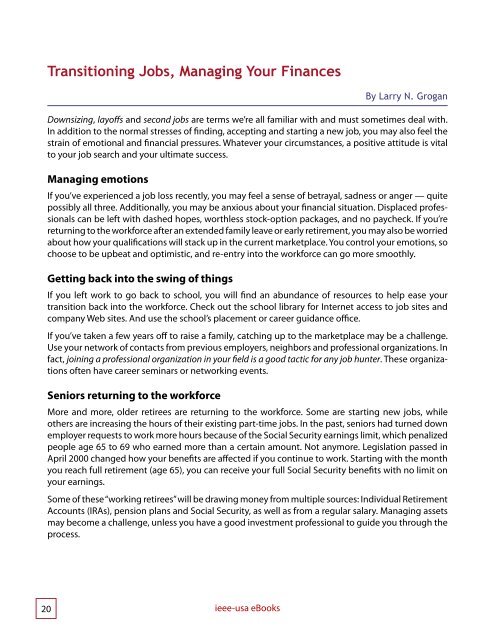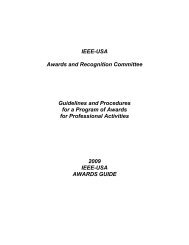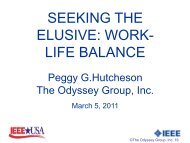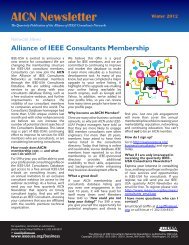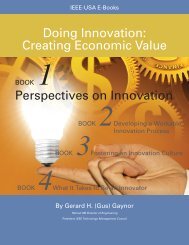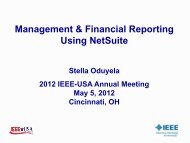on Career Survival - IEEE-USA
on Career Survival - IEEE-USA
on Career Survival - IEEE-USA
You also want an ePaper? Increase the reach of your titles
YUMPU automatically turns print PDFs into web optimized ePapers that Google loves.
Transiti<strong>on</strong>ing Jobs, Managing Your Finances<br />
By Larry N. Grogan<br />
Downsizing, layoffs and sec<strong>on</strong>d jobs are terms we’re all familiar with and must sometimes deal with.<br />
In additi<strong>on</strong> to the normal stresses of finding, accepting and starting a new job, you may also feel the<br />
strain of emoti<strong>on</strong>al and financial pressures. Whatever your circumstances, a positive attitude is vital<br />
to your job search and your ultimate success.<br />
Managing emoti<strong>on</strong>s<br />
If you’ve experienced a job loss recently, you may feel a sense of betrayal, sadness or anger — quite<br />
possibly all three. Additi<strong>on</strong>ally, you may be anxious about your financial situati<strong>on</strong>. Displaced professi<strong>on</strong>als<br />
can be left with dashed hopes, worthless stock-opti<strong>on</strong> packages, and no paycheck. If you’re<br />
returning to the workforce after an extended family leave or early retirement, you may also be worried<br />
about how your qualificati<strong>on</strong>s will stack up in the current marketplace. You c<strong>on</strong>trol your emoti<strong>on</strong>s, so<br />
choose to be upbeat and optimistic, and re-entry into the workforce can go more smoothly.<br />
Getting back into the swing of things<br />
If you left work to go back to school, you will find an abundance of resources to help ease your<br />
transiti<strong>on</strong> back into the workforce. Check out the school library for Internet access to job sites and<br />
company Web sites. And use the school’s placement or career guidance office.<br />
If you’ve taken a few years off to raise a family, catching up to the marketplace may be a challenge.<br />
Use your network of c<strong>on</strong>tacts from previous employers, neighbors and professi<strong>on</strong>al organizati<strong>on</strong>s. In<br />
fact, joining a professi<strong>on</strong>al organizati<strong>on</strong> in your field is a good tactic for any job hunter. These organizati<strong>on</strong>s<br />
often have career seminars or networking events.<br />
Seniors returning to the workforce<br />
More and more, older retirees are returning to the workforce. Some are starting new jobs, while<br />
others are increasing the hours of their existing part-time jobs. In the past, seniors had turned down<br />
employer requests to work more hours because of the Social Security earnings limit, which penalized<br />
people age 65 to 69 who earned more than a certain amount. Not anymore. Legislati<strong>on</strong> passed in<br />
April 2000 changed how your benefits are affected if you c<strong>on</strong>tinue to work. Starting with the m<strong>on</strong>th<br />
you reach full retirement (age 65), you can receive your full Social Security benefits with no limit <strong>on</strong><br />
your earnings.<br />
Some of these “working retirees” will be drawing m<strong>on</strong>ey from multiple sources: Individual Retirement<br />
Accounts (IRAs), pensi<strong>on</strong> plans and Social Security, as well as from a regular salary. Managing assets<br />
may become a challenge, unless you have a good investment professi<strong>on</strong>al to guide you through the<br />
process.<br />
20<br />
ieee-usa eBooks


